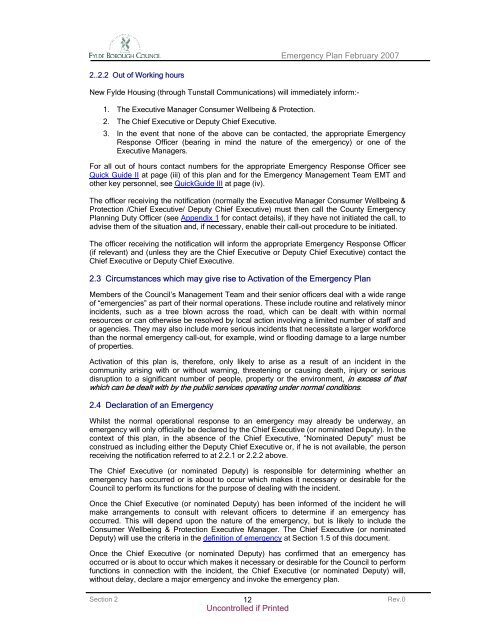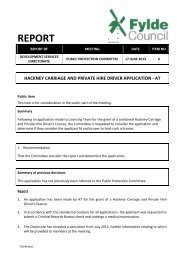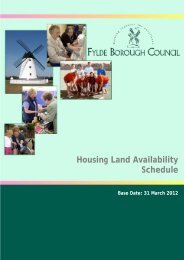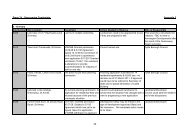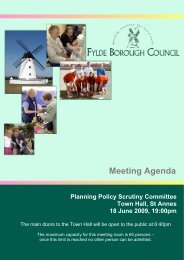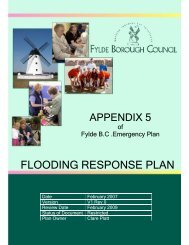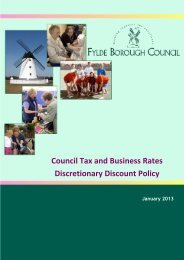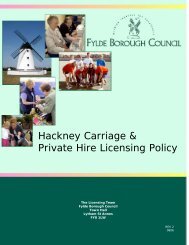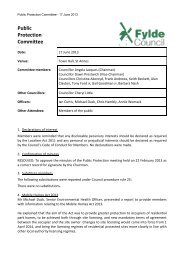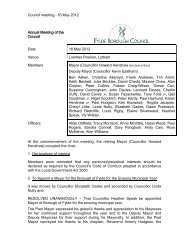Emergency Plan - Fylde Borough Council
Emergency Plan - Fylde Borough Council
Emergency Plan - Fylde Borough Council
You also want an ePaper? Increase the reach of your titles
YUMPU automatically turns print PDFs into web optimized ePapers that Google loves.
<strong>Emergency</strong> <strong>Plan</strong> February 2007<br />
2..2.2 Out of Working hours<br />
New <strong>Fylde</strong> Housing (through Tunstall Communications) will immediately inform:-<br />
1. The Executive Manager Consumer Wellbeing & Protection.<br />
2. The Chief Executive or Deputy Chief Executive.<br />
3. In the event that none of the above can be contacted, the appropriate <strong>Emergency</strong><br />
Response Officer (bearing in mind the nature of the emergency) or one of the<br />
Executive Managers.<br />
For all out of hours contact numbers for the appropriate <strong>Emergency</strong> Response Officer see<br />
Quick Guide II at page (iii) of this plan and for the <strong>Emergency</strong> Management Team EMT and<br />
other key personnel, see QuickGuide III at page (iv).<br />
The officer receiving the notification (normally the Executive Manager Consumer Wellbeing &<br />
Protection /Chief Executive/ Deputy Chief Executive) must then call the County <strong>Emergency</strong><br />
<strong>Plan</strong>ning Duty Officer (see Appendix 1 for contact details), if they have not initiated the call, to<br />
advise them of the situation and, if necessary, enable their call-out procedure to be initiated.<br />
The officer receiving the notification will inform the appropriate <strong>Emergency</strong> Response Officer<br />
(if relevant) and (unless they are the Chief Executive or Deputy Chief Executive) contact the<br />
Chief Executive or Deputy Chief Executive.<br />
2.3 Circumstances which may give rise to Activation of the <strong>Emergency</strong> <strong>Plan</strong><br />
Members of the <strong>Council</strong>’s Management Team and their senior officers deal with a wide range<br />
of “emergencies” as part of their normal operations. These include routine and relatively minor<br />
incidents, such as a tree blown across the road, which can be dealt with within normal<br />
resources or can otherwise be resolved by local action involving a limited number of staff and<br />
or agencies. They may also include more serious incidents that necessitate a larger workforce<br />
than the normal emergency call-out, for example, wind or flooding damage to a large number<br />
of properties.<br />
Activation of this plan is, therefore, only likely to arise as a result of an incident in the<br />
community arising with or without warning, threatening or causing death, injury or serious<br />
disruption to a significant number of people, property or the environment, in excess of that<br />
which can be dealt with by the public services operating under normal conditions.<br />
2.4 Declaration of an <strong>Emergency</strong><br />
Whilst the normal operational response to an emergency may already be underway, an<br />
emergency will only officially be declared by the Chief Executive (or nominated Deputy). In the<br />
context of this plan, in the absence of the Chief Executive, “Nominated Deputy” must be<br />
construed as including either the Deputy Chief Executive or, if he is not available, the person<br />
receiving the notification referred to at 2.2.1 or 2.2.2 above.<br />
The Chief Executive (or nominated Deputy) is responsible for determining whether an<br />
emergency has occurred or is about to occur which makes it necessary or desirable for the<br />
<strong>Council</strong> to perform its functions for the purpose of dealing with the incident.<br />
Once the Chief Executive (or nominated Deputy) has been informed of the incident he will<br />
make arrangements to consult with relevant officers to determine if an emergency has<br />
occurred. This will depend upon the nature of the emergency, but is likely to include the<br />
Consumer Wellbeing & Protection Executive Manager. The Chief Executive (or nominated<br />
Deputy) will use the criteria in the definition of emergency at Section 1.5 of this document.<br />
Once the Chief Executive (or nominated Deputy) has confirmed that an emergency has<br />
occurred or is about to occur which makes it necessary or desirable for the <strong>Council</strong> to perform<br />
functions in connection with the incident, the Chief Executive (or nominated Deputy) will,<br />
without delay, declare a major emergency and invoke the emergency plan.<br />
Section 2<br />
12<br />
Uncontrolled if Printed<br />
Rev.0


